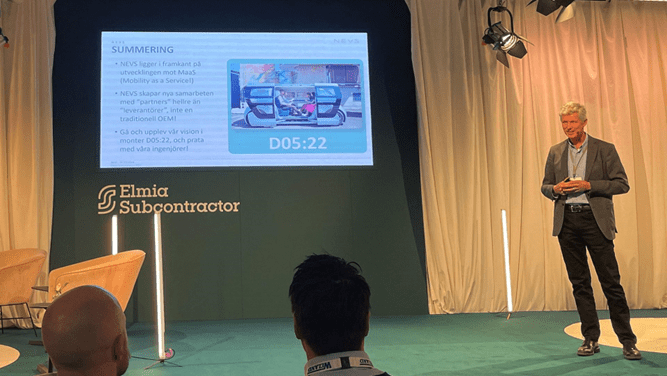Future industry will demand sustainability-focused suppliers
Two weeks ago, we had the pleasure to attend the Elmia Subcontractor Fair in Jönköping, Sweden. A trade fair recognised as Northern Europe’s leading fair for subcontractors in the manufacturing industry – the place to be for getting the latest news in the industry, and a great opportunity to find new business partners and contacts.
Many inspiring speakers took the stage with sustainability, energy efficiency, as well as greater competitiveness through research collaboration being the major subjects among these keynote speakers.

How will these issues affect today’s suppliers?
Agility is essential
Presence in less limited areas worldwide. Autonomous and electrified are new commons in the industry, and technical changes result in different kinds of suppliers compared to the ones that are currently supplying to e.g. the traditional automotive industry. “Suppliers that can deliver small to mid-size volumes and can respond swiftly to change.” says Peter Dahl, Program Director at NEVS. Dahl also prefers to talk about partners rather than suppliers.
As many of the companies in Elmia Subcontractor are midsize players looking for new opportunities, these players are also readily available and approachable for discussing various supply solutions. As it becomes more important to respond to changes, the smaller players become more attractive and are growing in importance for the supply chain. This is where Elmia Subcontractor can provide a great foundation for preparing for future challenges.
Carbon dioxide-neutral supply chain
For many great industry giants e.g. Scania, the supply chain must be carbon neutral by 2030. This will naturally affect suppliers that currently have processes which generate a lot of carbon dioxide – energy use is, after all, the main villain when it comes to the manufacturing process.
Although industry in the Nordic countries also uses a lot of electricity, the advantage of the Nordic industry is that it is possible to choose electricity that is fossil-free. That alone is a great step.
Tips related to supplier chains refer to how suppliers can influence their attractiveness, for example by focusing on production processes, material choices, and by intervening in energy production and waste sorting. By focusing on small things which all contribute towards a greater sustainability, companies can increase their competitiveness.
It is common for manufacturers to start their own energy production by investing in wind- and solar energy plants. Manufacturers increasingly offer products where the customers can select the degree of carbon which is used in the manufacturing of products, to affect their own carbon footprint in their supply chains.
How to make business out of sustainability
At the end of the day, the most important is the answer to the biggest question:
Is your company able to keep up with the changes in order to achieve the set business goals?
As a business owner you must respond to the necessary requirements. A business of sustainability is formed by politics and business principles, but the hands-on contribution for sustainable business is in the hands of manufacturers who need to meet requirements to continue doing business. In the end, it is not only a matter of “want” but also a matter of “must”.
However, if one is early out when it comes to meeting these requirements and being loud about it, that surely gives an advantage.
Strength of joint research centres
Elmia Subcontractor is a great hub and forum to catch up on the present and future topics and trends. It is obvious that Sweden is a forerunner in sustainable transition, which also brings complex societal changes that require new solutions which can be developed only through research, innovation, and effective development.
Sweden’s strength within research manifests itself in joint projects and development centres between government and industry players, whose spinoffs and long-term development projects result in world-leading technology products and services that take environmental goals and the challenges of sustainable development into account. Such research centres, institutions, and projects provide a common foundation and lead to common ground for local, regional, and national development.
During the fair, Export Maker has interviewed several Swedish companies and institutions to build an understanding whether all the talking about sustainability actually shows in practice. Many responded that the walk between politics and practice takes time, but it is important to already start the walk, as you cannot catch up by running later on. More information and great support is provided by e.g. RISE (Research Institute of Sweden).
– Henri Karhu, Project Manager Sweden
